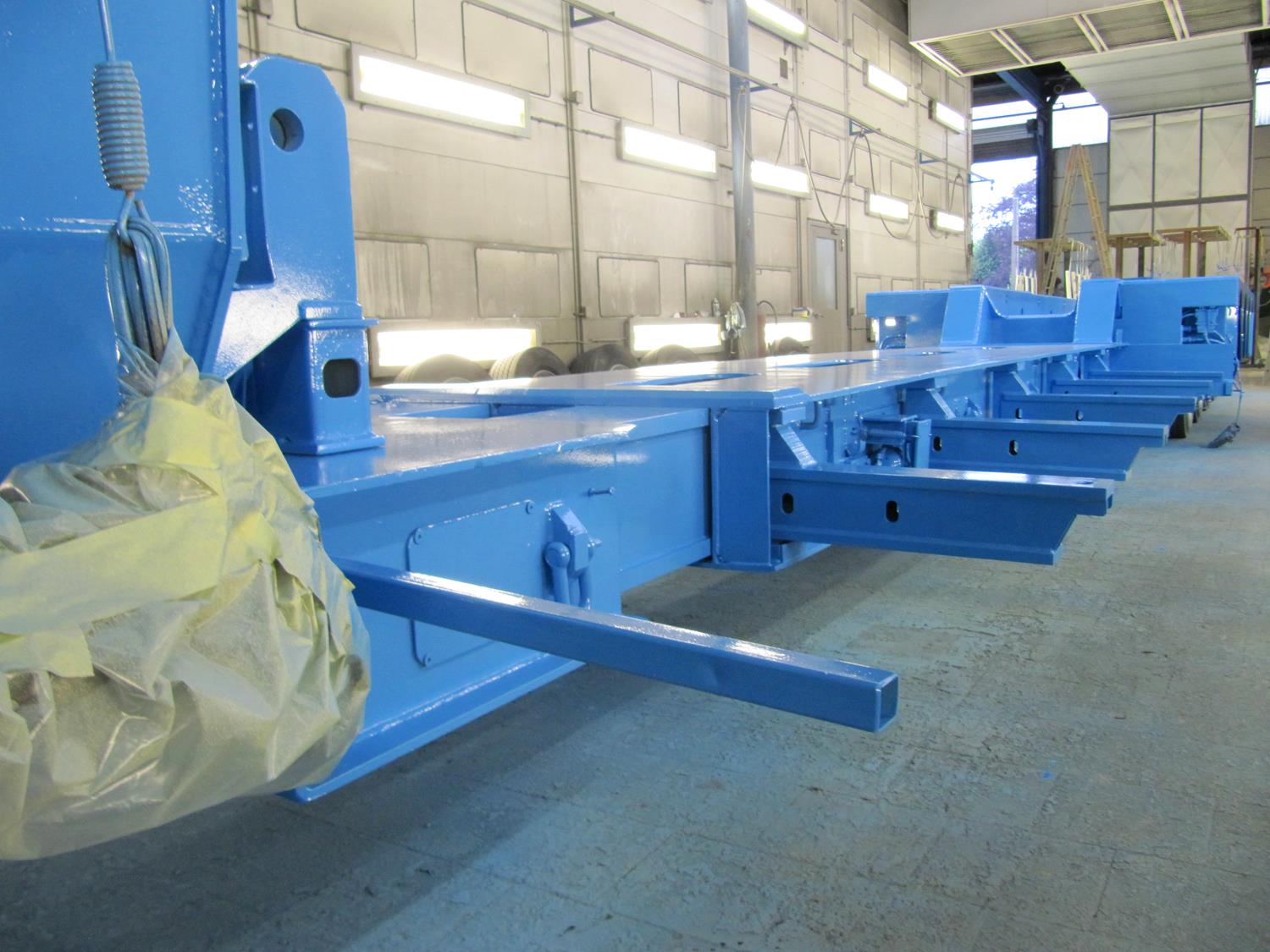
Insights
October 31, 2024
WH Malcolm Extends Trailer Lifespans with New Reconditioning Scheme – Driving Sustainability in Fleet Management

Insights
October 31, 2024
WH Malcolm Extends Trailer Lifespans with New Reconditioning Scheme – Driving Sustainability in Fleet Management
WH Malcolm introduces a trailer reconditioning scheme to extend fleet life, reduce costs, and support sustainability, marking a shift toward eco-friendly logistics practices.
WH Malcolm, a prominent Scottish logistics company, has taken a major step toward sustainable fleet management by launching a reconditioning program for its semi-trailer fleet. This initiative aims to extend the life of trailers, reduce environmental impact, and lower fleet costs. By focusing on reconditioning SAF-Holland axles and other essential trailer components, WH Malcolm is embracing a trend in logistics that prioritizes equipment sustainability over continuous replacement.
In this article, we’ll explore the key aspects of WH Malcolm’s reconditioning scheme, the benefits it brings to fleet management and the environment, and its broader impact on the logistics industry’s shift toward sustainable practices.
Overview of WH Malcolm’s Reconditioning Scheme
1.1 Key Details of the Reconditioning Program
WH Malcolm’s reconditioning program is a strategic shift that emphasizes repairing and refurbishing existing trailer components rather than replacing trailers entirely.
Reconditioning Program Process and Scope:
The program involves reconditioning SAF-Holland axles on semi-trailers to restore them to near-original condition. By focusing on key trailer parts that endure significant wear and tear, WH Malcolm aims to improve trailer longevity and maintain performance standards without the need for constant replacements.
Motivation for the Reconditioning Initiative:
This initiative addresses several motivations for WH Malcolm, including reducing costs associated with frequent fleet replacements, lowering environmental impact, and maintaining high levels of fleet reliability and efficiency. The program reflects the company’s long-term commitment to sustainability in logistics.
1.2 Importance of Sustainable Fleet Maintenance
As the logistics industry increasingly embraces sustainability, practices like reconditioning are becoming essential to environmental responsibility and cost management.
Environmental Benefits of Reconditioning Over Replacement:
Reconditioning reduces the need for raw materials and minimizes waste associated with new trailer production. Compared to full replacements, reconditioning has a significantly smaller carbon footprint, contributing to the company’s sustainability goals.
Growing Industry Trend Toward Sustainable Maintenance:
WH Malcolm’s initiative aligns with an industry-wide shift in logistics toward sustainable practices in fleet and equipment maintenance. The company’s investment in reconditioning reflects a growing commitment in the sector to adopt green practices that minimize environmental impact.
Benefits of Extending Trailer Lifespans
2.1 Cost Savings and Operational Efficiency
Extending trailer lifespans offers WH Malcolm cost benefits and improves operational efficiency across its fleet.
Reduced Fleet Replacement Costs:
By reconditioning trailers instead of replacing them, WH Malcolm saves on the high capital costs associated with purchasing new trailers. This cost-effective approach allows the company to allocate resources to other strategic investments and supports financial sustainability.
Operational Efficiency and Reduced Downtime:
Reconditioned trailers experience fewer breakdowns and can operate reliably, reducing downtime and improving overall operational efficiency. With a dependable fleet, WH Malcolm can maintain its service quality and meet delivery schedules without frequent interruptions.
2.2 Environmental Impact Reduction
The environmental benefits of reconditioning trailers align with WH Malcolm’s sustainability goals and contribute to a reduced carbon footprint.
Minimizing Carbon Footprint with Reconditioned Parts:
Reconditioning reduces the demand for new materials and the energy required for manufacturing, which lowers CO2 emissions associated with trailer production. This reduction is crucial for logistics companies working to decrease their carbon footprint and align with global sustainability standards.
Reduced Waste Through Reusable Components:
By using reconditioned SAF-Holland axles and other trailer parts, WH Malcolm minimizes waste generated by discarded components. This approach supports a more circular economy within logistics, where components are repaired and reused rather than discarded.
Impact on Fleet Management and Logistics Industry
3.1 Promoting Sustainability in Fleet Management
WH Malcolm’s initiative not only benefits its own fleet but also sets an example for sustainability in the logistics industry.
Setting an Example for the Logistics Sector:
WH Malcolm’s reconditioning program positions the company as a leader in sustainable fleet management. This initiative may inspire other logistics companies to consider reconditioning and green maintenance practices, fostering industry-wide adoption of sustainable approaches.
Enhancing Public and Client Perception:
In today’s sustainability-conscious market, companies with eco-friendly practices appeal to clients and partners who prioritize environmental responsibility. WH Malcolm’s reconditioning program strengthens its brand image as a company committed to reducing environmental impact, which can attract clients seeking sustainable logistics solutions.
3.2 Long-Term Benefits for Fleet Health and Maintenance
The program offers long-term advantages for WH Malcolm’s fleet health, promoting durability and reducing the frequency of replacement cycles.
Prolonged Equipment Lifespans:
With reconditioned trailers, WH Malcolm extends the life of its fleet, reducing the need to purchase new trailers frequently. This longevity not only lowers costs but also ensures that the fleet remains reliable and effective over time.
Increased Resilience and Adaptability:
By maintaining a resilient fleet through reconditioning, WH Malcolm can better adapt to market demands and logistical challenges. This adaptability strengthens the company’s ability to provide consistent service without frequent disruptions due to equipment failures.
Challenges and Future Prospects for Trailer Reconditioning
4.1 Overcoming Initial Setup and Implementation Costs
While reconditioning offers numerous benefits, there are some challenges associated with implementing such a program.
Investment in Reconditioning Equipment and Processes:
Setting up a reconditioning program requires upfront investment in specialized equipment, facilities, and training for staff. For smaller companies, these costs may be a barrier to adopting similar programs, though the long-term savings can offset the initial expenditure.
Managing Quality Control in Reconditioned Components:
Ensuring that reconditioned components meet safety and performance standards is essential for maintaining fleet reliability. Quality control processes must be rigorous to verify that reconditioned trailers meet industry standards and comply with regulatory requirements.
4.2 Future Opportunities in Sustainable Fleet Maintenance
The success of WH Malcolm’s reconditioning program opens up additional opportunities for sustainable practices in logistics.
Expanding Reconditioning Programs to Additional Equipment:
WH Malcolm could extend reconditioning practices to other fleet components, such as engines or braking systems, maximizing sustainability across the entire fleet. This approach would enhance the company’s green initiatives and further reduce environmental impact.
Leveraging Technology for Efficiency in Maintenance:
By integrating predictive maintenance tools and data-driven insights, WH Malcolm can improve efficiency in reconditioning and proactively manage fleet health. This technological integration can optimize fleet management, ensuring timely reconditioning and minimizing unexpected repairs.
Conclusion
WH Malcolm’s reconditioning scheme marks a substantial advancement in sustainable fleet management. By extending trailer lifespans and reducing environmental impact, the company is not only cutting costs but also setting a positive example in the logistics industry. Reconditioning practices are essential for companies looking to reduce material waste, lower emissions, and contribute to a circular economy within logistics.
As WH Malcolm continues to expand its sustainability initiatives, this program highlights the financial and environmental benefits that green maintenance practices bring to logistics providers. By investing in reconditioning and embracing eco-friendly practices, WH Malcolm is supporting a future where logistics is both efficient and environmentally responsible.
Key Takeaways:
WH Malcolm’s reconditioning program extends trailer lifespans, reducing replacement costs and supporting fleet sustainability.
The program reduces material waste, lowers emissions, and aligns with the logistics industry’s shift toward sustainable practices.
Future opportunities in sustainable fleet management include expanding reconditioning to additional equipment and integrating technology for optimized maintenance.
Fleet managers, are you exploring sustainable maintenance solutions? Share your experiences with reconditioning and green fleet management below!
WH Malcolm, a prominent Scottish logistics company, has taken a major step toward sustainable fleet management by launching a reconditioning program for its semi-trailer fleet. This initiative aims to extend the life of trailers, reduce environmental impact, and lower fleet costs. By focusing on reconditioning SAF-Holland axles and other essential trailer components, WH Malcolm is embracing a trend in logistics that prioritizes equipment sustainability over continuous replacement.
In this article, we’ll explore the key aspects of WH Malcolm’s reconditioning scheme, the benefits it brings to fleet management and the environment, and its broader impact on the logistics industry’s shift toward sustainable practices.
Overview of WH Malcolm’s Reconditioning Scheme
1.1 Key Details of the Reconditioning Program
WH Malcolm’s reconditioning program is a strategic shift that emphasizes repairing and refurbishing existing trailer components rather than replacing trailers entirely.
Reconditioning Program Process and Scope:
The program involves reconditioning SAF-Holland axles on semi-trailers to restore them to near-original condition. By focusing on key trailer parts that endure significant wear and tear, WH Malcolm aims to improve trailer longevity and maintain performance standards without the need for constant replacements.
Motivation for the Reconditioning Initiative:
This initiative addresses several motivations for WH Malcolm, including reducing costs associated with frequent fleet replacements, lowering environmental impact, and maintaining high levels of fleet reliability and efficiency. The program reflects the company’s long-term commitment to sustainability in logistics.
1.2 Importance of Sustainable Fleet Maintenance
As the logistics industry increasingly embraces sustainability, practices like reconditioning are becoming essential to environmental responsibility and cost management.
Environmental Benefits of Reconditioning Over Replacement:
Reconditioning reduces the need for raw materials and minimizes waste associated with new trailer production. Compared to full replacements, reconditioning has a significantly smaller carbon footprint, contributing to the company’s sustainability goals.
Growing Industry Trend Toward Sustainable Maintenance:
WH Malcolm’s initiative aligns with an industry-wide shift in logistics toward sustainable practices in fleet and equipment maintenance. The company’s investment in reconditioning reflects a growing commitment in the sector to adopt green practices that minimize environmental impact.
Benefits of Extending Trailer Lifespans
2.1 Cost Savings and Operational Efficiency
Extending trailer lifespans offers WH Malcolm cost benefits and improves operational efficiency across its fleet.
Reduced Fleet Replacement Costs:
By reconditioning trailers instead of replacing them, WH Malcolm saves on the high capital costs associated with purchasing new trailers. This cost-effective approach allows the company to allocate resources to other strategic investments and supports financial sustainability.
Operational Efficiency and Reduced Downtime:
Reconditioned trailers experience fewer breakdowns and can operate reliably, reducing downtime and improving overall operational efficiency. With a dependable fleet, WH Malcolm can maintain its service quality and meet delivery schedules without frequent interruptions.
2.2 Environmental Impact Reduction
The environmental benefits of reconditioning trailers align with WH Malcolm’s sustainability goals and contribute to a reduced carbon footprint.
Minimizing Carbon Footprint with Reconditioned Parts:
Reconditioning reduces the demand for new materials and the energy required for manufacturing, which lowers CO2 emissions associated with trailer production. This reduction is crucial for logistics companies working to decrease their carbon footprint and align with global sustainability standards.
Reduced Waste Through Reusable Components:
By using reconditioned SAF-Holland axles and other trailer parts, WH Malcolm minimizes waste generated by discarded components. This approach supports a more circular economy within logistics, where components are repaired and reused rather than discarded.
Impact on Fleet Management and Logistics Industry
3.1 Promoting Sustainability in Fleet Management
WH Malcolm’s initiative not only benefits its own fleet but also sets an example for sustainability in the logistics industry.
Setting an Example for the Logistics Sector:
WH Malcolm’s reconditioning program positions the company as a leader in sustainable fleet management. This initiative may inspire other logistics companies to consider reconditioning and green maintenance practices, fostering industry-wide adoption of sustainable approaches.
Enhancing Public and Client Perception:
In today’s sustainability-conscious market, companies with eco-friendly practices appeal to clients and partners who prioritize environmental responsibility. WH Malcolm’s reconditioning program strengthens its brand image as a company committed to reducing environmental impact, which can attract clients seeking sustainable logistics solutions.
3.2 Long-Term Benefits for Fleet Health and Maintenance
The program offers long-term advantages for WH Malcolm’s fleet health, promoting durability and reducing the frequency of replacement cycles.
Prolonged Equipment Lifespans:
With reconditioned trailers, WH Malcolm extends the life of its fleet, reducing the need to purchase new trailers frequently. This longevity not only lowers costs but also ensures that the fleet remains reliable and effective over time.
Increased Resilience and Adaptability:
By maintaining a resilient fleet through reconditioning, WH Malcolm can better adapt to market demands and logistical challenges. This adaptability strengthens the company’s ability to provide consistent service without frequent disruptions due to equipment failures.
Challenges and Future Prospects for Trailer Reconditioning
4.1 Overcoming Initial Setup and Implementation Costs
While reconditioning offers numerous benefits, there are some challenges associated with implementing such a program.
Investment in Reconditioning Equipment and Processes:
Setting up a reconditioning program requires upfront investment in specialized equipment, facilities, and training for staff. For smaller companies, these costs may be a barrier to adopting similar programs, though the long-term savings can offset the initial expenditure.
Managing Quality Control in Reconditioned Components:
Ensuring that reconditioned components meet safety and performance standards is essential for maintaining fleet reliability. Quality control processes must be rigorous to verify that reconditioned trailers meet industry standards and comply with regulatory requirements.
4.2 Future Opportunities in Sustainable Fleet Maintenance
The success of WH Malcolm’s reconditioning program opens up additional opportunities for sustainable practices in logistics.
Expanding Reconditioning Programs to Additional Equipment:
WH Malcolm could extend reconditioning practices to other fleet components, such as engines or braking systems, maximizing sustainability across the entire fleet. This approach would enhance the company’s green initiatives and further reduce environmental impact.
Leveraging Technology for Efficiency in Maintenance:
By integrating predictive maintenance tools and data-driven insights, WH Malcolm can improve efficiency in reconditioning and proactively manage fleet health. This technological integration can optimize fleet management, ensuring timely reconditioning and minimizing unexpected repairs.
Conclusion
WH Malcolm’s reconditioning scheme marks a substantial advancement in sustainable fleet management. By extending trailer lifespans and reducing environmental impact, the company is not only cutting costs but also setting a positive example in the logistics industry. Reconditioning practices are essential for companies looking to reduce material waste, lower emissions, and contribute to a circular economy within logistics.
As WH Malcolm continues to expand its sustainability initiatives, this program highlights the financial and environmental benefits that green maintenance practices bring to logistics providers. By investing in reconditioning and embracing eco-friendly practices, WH Malcolm is supporting a future where logistics is both efficient and environmentally responsible.
Key Takeaways:
WH Malcolm’s reconditioning program extends trailer lifespans, reducing replacement costs and supporting fleet sustainability.
The program reduces material waste, lowers emissions, and aligns with the logistics industry’s shift toward sustainable practices.
Future opportunities in sustainable fleet management include expanding reconditioning to additional equipment and integrating technology for optimized maintenance.
Fleet managers, are you exploring sustainable maintenance solutions? Share your experiences with reconditioning and green fleet management below!
WH Malcolm introduces a trailer reconditioning scheme to extend fleet life, reduce costs, and support sustainability, marking a shift toward eco-friendly logistics practices.
WH Malcolm, a prominent Scottish logistics company, has taken a major step toward sustainable fleet management by launching a reconditioning program for its semi-trailer fleet. This initiative aims to extend the life of trailers, reduce environmental impact, and lower fleet costs. By focusing on reconditioning SAF-Holland axles and other essential trailer components, WH Malcolm is embracing a trend in logistics that prioritizes equipment sustainability over continuous replacement.
In this article, we’ll explore the key aspects of WH Malcolm’s reconditioning scheme, the benefits it brings to fleet management and the environment, and its broader impact on the logistics industry’s shift toward sustainable practices.
Overview of WH Malcolm’s Reconditioning Scheme
1.1 Key Details of the Reconditioning Program
WH Malcolm’s reconditioning program is a strategic shift that emphasizes repairing and refurbishing existing trailer components rather than replacing trailers entirely.
Reconditioning Program Process and Scope:
The program involves reconditioning SAF-Holland axles on semi-trailers to restore them to near-original condition. By focusing on key trailer parts that endure significant wear and tear, WH Malcolm aims to improve trailer longevity and maintain performance standards without the need for constant replacements.
Motivation for the Reconditioning Initiative:
This initiative addresses several motivations for WH Malcolm, including reducing costs associated with frequent fleet replacements, lowering environmental impact, and maintaining high levels of fleet reliability and efficiency. The program reflects the company’s long-term commitment to sustainability in logistics.
1.2 Importance of Sustainable Fleet Maintenance
As the logistics industry increasingly embraces sustainability, practices like reconditioning are becoming essential to environmental responsibility and cost management.
Environmental Benefits of Reconditioning Over Replacement:
Reconditioning reduces the need for raw materials and minimizes waste associated with new trailer production. Compared to full replacements, reconditioning has a significantly smaller carbon footprint, contributing to the company’s sustainability goals.
Growing Industry Trend Toward Sustainable Maintenance:
WH Malcolm’s initiative aligns with an industry-wide shift in logistics toward sustainable practices in fleet and equipment maintenance. The company’s investment in reconditioning reflects a growing commitment in the sector to adopt green practices that minimize environmental impact.
Benefits of Extending Trailer Lifespans
2.1 Cost Savings and Operational Efficiency
Extending trailer lifespans offers WH Malcolm cost benefits and improves operational efficiency across its fleet.
Reduced Fleet Replacement Costs:
By reconditioning trailers instead of replacing them, WH Malcolm saves on the high capital costs associated with purchasing new trailers. This cost-effective approach allows the company to allocate resources to other strategic investments and supports financial sustainability.
Operational Efficiency and Reduced Downtime:
Reconditioned trailers experience fewer breakdowns and can operate reliably, reducing downtime and improving overall operational efficiency. With a dependable fleet, WH Malcolm can maintain its service quality and meet delivery schedules without frequent interruptions.
2.2 Environmental Impact Reduction
The environmental benefits of reconditioning trailers align with WH Malcolm’s sustainability goals and contribute to a reduced carbon footprint.
Minimizing Carbon Footprint with Reconditioned Parts:
Reconditioning reduces the demand for new materials and the energy required for manufacturing, which lowers CO2 emissions associated with trailer production. This reduction is crucial for logistics companies working to decrease their carbon footprint and align with global sustainability standards.
Reduced Waste Through Reusable Components:
By using reconditioned SAF-Holland axles and other trailer parts, WH Malcolm minimizes waste generated by discarded components. This approach supports a more circular economy within logistics, where components are repaired and reused rather than discarded.
Impact on Fleet Management and Logistics Industry
3.1 Promoting Sustainability in Fleet Management
WH Malcolm’s initiative not only benefits its own fleet but also sets an example for sustainability in the logistics industry.
Setting an Example for the Logistics Sector:
WH Malcolm’s reconditioning program positions the company as a leader in sustainable fleet management. This initiative may inspire other logistics companies to consider reconditioning and green maintenance practices, fostering industry-wide adoption of sustainable approaches.
Enhancing Public and Client Perception:
In today’s sustainability-conscious market, companies with eco-friendly practices appeal to clients and partners who prioritize environmental responsibility. WH Malcolm’s reconditioning program strengthens its brand image as a company committed to reducing environmental impact, which can attract clients seeking sustainable logistics solutions.
3.2 Long-Term Benefits for Fleet Health and Maintenance
The program offers long-term advantages for WH Malcolm’s fleet health, promoting durability and reducing the frequency of replacement cycles.
Prolonged Equipment Lifespans:
With reconditioned trailers, WH Malcolm extends the life of its fleet, reducing the need to purchase new trailers frequently. This longevity not only lowers costs but also ensures that the fleet remains reliable and effective over time.
Increased Resilience and Adaptability:
By maintaining a resilient fleet through reconditioning, WH Malcolm can better adapt to market demands and logistical challenges. This adaptability strengthens the company’s ability to provide consistent service without frequent disruptions due to equipment failures.
Challenges and Future Prospects for Trailer Reconditioning
4.1 Overcoming Initial Setup and Implementation Costs
While reconditioning offers numerous benefits, there are some challenges associated with implementing such a program.
Investment in Reconditioning Equipment and Processes:
Setting up a reconditioning program requires upfront investment in specialized equipment, facilities, and training for staff. For smaller companies, these costs may be a barrier to adopting similar programs, though the long-term savings can offset the initial expenditure.
Managing Quality Control in Reconditioned Components:
Ensuring that reconditioned components meet safety and performance standards is essential for maintaining fleet reliability. Quality control processes must be rigorous to verify that reconditioned trailers meet industry standards and comply with regulatory requirements.
4.2 Future Opportunities in Sustainable Fleet Maintenance
The success of WH Malcolm’s reconditioning program opens up additional opportunities for sustainable practices in logistics.
Expanding Reconditioning Programs to Additional Equipment:
WH Malcolm could extend reconditioning practices to other fleet components, such as engines or braking systems, maximizing sustainability across the entire fleet. This approach would enhance the company’s green initiatives and further reduce environmental impact.
Leveraging Technology for Efficiency in Maintenance:
By integrating predictive maintenance tools and data-driven insights, WH Malcolm can improve efficiency in reconditioning and proactively manage fleet health. This technological integration can optimize fleet management, ensuring timely reconditioning and minimizing unexpected repairs.
Conclusion
WH Malcolm’s reconditioning scheme marks a substantial advancement in sustainable fleet management. By extending trailer lifespans and reducing environmental impact, the company is not only cutting costs but also setting a positive example in the logistics industry. Reconditioning practices are essential for companies looking to reduce material waste, lower emissions, and contribute to a circular economy within logistics.
As WH Malcolm continues to expand its sustainability initiatives, this program highlights the financial and environmental benefits that green maintenance practices bring to logistics providers. By investing in reconditioning and embracing eco-friendly practices, WH Malcolm is supporting a future where logistics is both efficient and environmentally responsible.
Key Takeaways:
WH Malcolm’s reconditioning program extends trailer lifespans, reducing replacement costs and supporting fleet sustainability.
The program reduces material waste, lowers emissions, and aligns with the logistics industry’s shift toward sustainable practices.
Future opportunities in sustainable fleet management include expanding reconditioning to additional equipment and integrating technology for optimized maintenance.
Fleet managers, are you exploring sustainable maintenance solutions? Share your experiences with reconditioning and green fleet management below!
Other Blogs
Other Blogs
Check our other project Blogs with useful insight and information for your businesses
Other Blogs
Other Blogs
Check our other project Blogs with useful insight and information for your businesses
Other Blogs
Other Blogs
Check our other project Blogs with useful insight and information for your businesses


